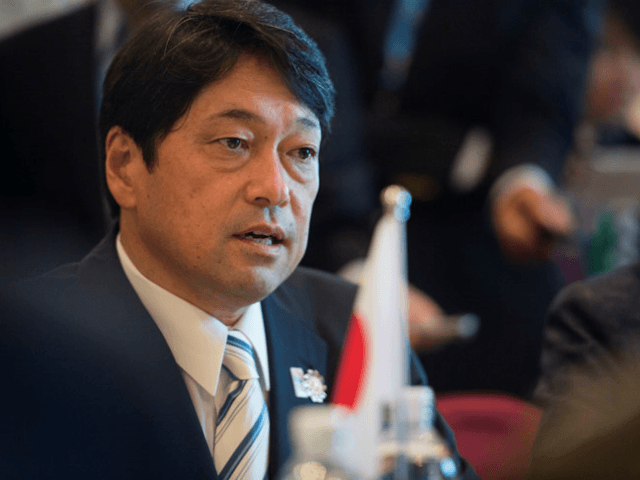Japanese Defense Minister Itsunori Onodera announced on Friday that Japan will purchase long-range missiles from the United States for the first time, citing the “increasingly severe” security situation faced by the island nation.
“We will implement stand-off missiles capable of defending ourselves adequately, when we are outside the range of the opponent, in order to ensure the safety of the Self Defense Force and to defend our nation effectively,” said Onodera.
A spokesman from his office specified to CNN that Japan will acquire both long-range anti-ship missiles and air-to-surface standoff missiles, both of which can be launched from F-15 fighters. In addition, Japan intends to purchase Joint Strike Missiles from a Norwegian supplier for its new F-35 stealth fighters.
CNN notes Onodera “did not mention North Korea by name in the announcement,” but, of course, he did not really have to. As Adam Mount of the Federation of American Scientists explained, standoff missiles give Japan a strong deterrent against North Korean mischief by providing Japanese forces with a credible means of quickly striking back at the North Korean mainland.
This is important because there are fears North Korea will calculate the United States might not risk a wider conflict by responding aggressively to an attack on Japan. Whether that is true or not is less important than whether North Korean military planners believe it is true. If Japan can act quickly to take out North Korean sites with missiles launched inside its own airspace, without American assistance, the deterrence calculation will definitely be altered.
In case there was any doubt, the Wall Street Journal explicitly states Japan’s new missiles will be able to “target North Korean military bases from long distance.” The missiles also give Japan the ability to respond to Chinese aggression in disputed waters, a fact unlikely to be lost on Beijing.
Onodera, however, explicitly denied the missiles were intended for such strikes. “The stand-off missiles we are introducing at this time are purely for our national defense and are not for the purpose of attacking enemy bases. In terms of striking enemy bases, the division of roles is such that we rely on the U.S., and we are not considering any change in those roles,” he said.
“The news of the purchase itself comes about a month after U.S. President Donald Trump visited Tokyo and suggested Japan should buy U.S. military equipment,” CNN notes.
Trump was criticized at the time for the bluntness of his sales pitch, which included promises that Japanese Prime Minister Shinzo Abe would be able to shoot North Korean missiles out of the sky with upgraded American weapons.
“The prime minister of Japan is going to be purchasing massive amounts of military equipment, as he should. It’s a lot of jobs for us and a lot of safety for Japan,” Trump said on November 6th.
Blunt as Trump’s invitation might have been, it was not an unreasonable case, and it was compatible with Abe’s longstanding goal of revising Japan’s constitution to allow for greater initiative in self-defense.
Buoyed by an enormous electoral victory this year, Abe seeks to give Japan a larger standing military force, one capable of assisting allies in danger, responding to terrorist attacks, and credibly deterring Chinese aggression, of which North Korea’s psychotic menace is an element. If he accomplishes his goals Abe will be, in his much more understated manner, as transformative a leader for Japan as President Xi Jinping has been for China. For the time being, his military reforms are being conducted through laws that reinterpret the Japanese constitution without changing it.
Asia Times on Wednesday discussed the possibility that Japan might obtain more than just stand-off missiles from America to defend itself, outlining a plan supported by some in Japan that is sometimes summarized as “renting nukes”: in essence, the United States would position tactical nuclear weapons in Japan that are normally under American control, but could be almost instantly placed under Japanese control in a crisis.
The goal is to circumvent Non-Proliferation Treaty provisions that bar Japan from developing its own arsenal, while also addressing the deterrence calculation addressed above—the fear that North Korea or other aggressors might come to doubt American willingness to go all the way in defense of Japan. If China doesn’t want to see such arrangements reached with Japan and possibly South Korea, it needs to act quickly and decisively to end the North Korean threat it has indulged for so long.

COMMENTS
Please let us know if you're having issues with commenting.